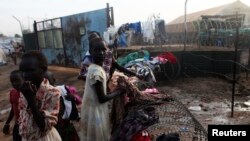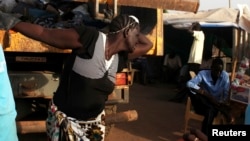JUBA —
Germany has released $13 million (10 million euros) to help the nearly one million South Sudanese who have been forced from their homes by more than three months of fighting, a top German official said as he wrapped up a visit here Thursday.
Germany's Minister for Economic Development and Cooperation, Gerd Mueller, said the funds have been released to the U.N.'s World Food Program (WFP) and would be available immediately to help South Sudan's displaced and refugees.
He called for peace to be restored in South Sudan so that Germany can resume development projects, the German Federal Ministry for Cooperation (BMZ) said in a release.
Only when peace has been restored "will it make sense for us to re-engage" in South Sudan, Mueller is quoted by the BMZ as telling President Salva Kiir when the two met in Juba Thursday, the second and last day of Mueller's visit.
Mueller also held talks with the head of the U.N. Mission in South Sudan (UNMISS), Hilde Johnson, and vowed not to abandon the South Sudanese people.
"Although we've had to interrupt our long-term development projects in South Sudan because of the fighting, we must not abandon the refugees," the BMZ quoted him as saying.
Fighting in South Sudan has brought German development projects in the country to a halt, Mueller said several times during his visit.
Mueller was accompanied on the visit by officials from the German government and NGOs, as well as journalists.
He was "deeply moved" as he toured UNMISS's Tomping compound in Juba where tens of thousands of South Sudanese have sought shelter since fighting erupted in December, the BMZ said.
'The suffering of the refugee families is great'
Speaking through an interpreter, Mueller told a news conference in Juba that Germany will continue to provide humanitarian assistance to the hundreds of thousands around South Sudan who, like the displaced people sheltering in the U.N. camp, have been forced by the fighting to flee their homes.
“The suffering of the refugee families is great," Mueller said.
"Germany is supporting these families and supporting aid agencies because we want to alleviate the suffering,” he said.
One of the South Sudanese officials who met with Mueller for talks on Thursday, acting Finance, Commerce, Investment and Economic Planning Minister Mary Jervas Yak, said the German delegation had "come to see for themselves what the situation is like in South Sudan... and how they can assist us... so that we can realize peace."
Mueller called on South Sudan’s leaders to take steps to prevent the outbreak of more violence so that citizens can concentrate on building their young nation, which he stressed was rich in natural resources and should have a bright future.
“This country is rich: it has oil money and rich agricultural fields," Mueller said.
"We could cooperate in the future but, first of all, this conflict must be stopped,” he told reporters.
Germany gave $36.3 million in aid to South Sudan between July 2012 and June of last year, according to data sent to VOA by the German embassy in Juba.
Mueller left South Sudan late Thursday for Mali, the second and last stop on his trip to Africa.
Karin Zeitvogel contributed to this story from Washington, D.C.
Germany's Minister for Economic Development and Cooperation, Gerd Mueller, said the funds have been released to the U.N.'s World Food Program (WFP) and would be available immediately to help South Sudan's displaced and refugees.
He called for peace to be restored in South Sudan so that Germany can resume development projects, the German Federal Ministry for Cooperation (BMZ) said in a release.
Only when peace has been restored "will it make sense for us to re-engage" in South Sudan, Mueller is quoted by the BMZ as telling President Salva Kiir when the two met in Juba Thursday, the second and last day of Mueller's visit.
Only when peace has been restored will it make sense for us to re-engage in South Sudan.Gerd Mueller, German Cooperation and Development Minister
Mueller also held talks with the head of the U.N. Mission in South Sudan (UNMISS), Hilde Johnson, and vowed not to abandon the South Sudanese people.
"Although we've had to interrupt our long-term development projects in South Sudan because of the fighting, we must not abandon the refugees," the BMZ quoted him as saying.
Fighting in South Sudan has brought German development projects in the country to a halt, Mueller said several times during his visit.
Mueller was accompanied on the visit by officials from the German government and NGOs, as well as journalists.
He was "deeply moved" as he toured UNMISS's Tomping compound in Juba where tens of thousands of South Sudanese have sought shelter since fighting erupted in December, the BMZ said.
'The suffering of the refugee families is great'
Speaking through an interpreter, Mueller told a news conference in Juba that Germany will continue to provide humanitarian assistance to the hundreds of thousands around South Sudan who, like the displaced people sheltering in the U.N. camp, have been forced by the fighting to flee their homes.
“The suffering of the refugee families is great," Mueller said.
"Germany is supporting these families and supporting aid agencies because we want to alleviate the suffering,” he said.
One of the South Sudanese officials who met with Mueller for talks on Thursday, acting Finance, Commerce, Investment and Economic Planning Minister Mary Jervas Yak, said the German delegation had "come to see for themselves what the situation is like in South Sudan... and how they can assist us... so that we can realize peace."
Mueller called on South Sudan’s leaders to take steps to prevent the outbreak of more violence so that citizens can concentrate on building their young nation, which he stressed was rich in natural resources and should have a bright future.
“This country is rich: it has oil money and rich agricultural fields," Mueller said.
"We could cooperate in the future but, first of all, this conflict must be stopped,” he told reporters.
Germany gave $36.3 million in aid to South Sudan between July 2012 and June of last year, according to data sent to VOA by the German embassy in Juba.
Mueller left South Sudan late Thursday for Mali, the second and last stop on his trip to Africa.
Karin Zeitvogel contributed to this story from Washington, D.C.






